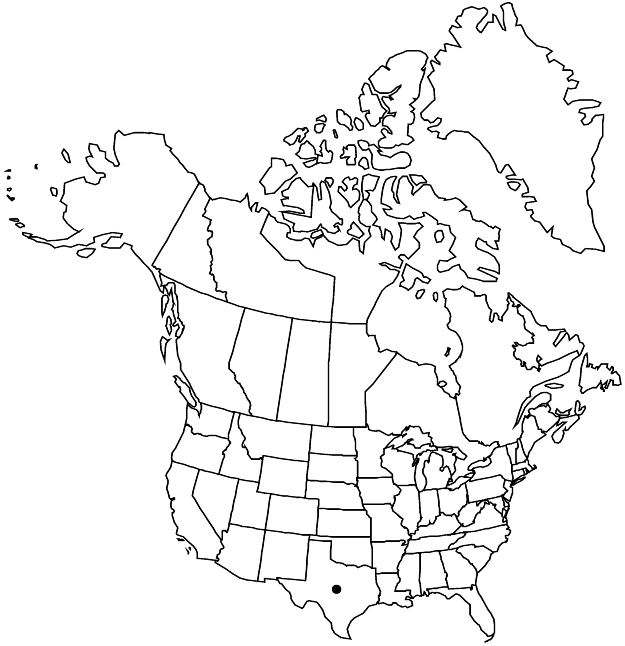Difference between revisions of "Euphorbia austrotexana"
J. Bot. Res. Inst. Texas 7: 634, figs. 1, 2[row 3, left & center]. 2013.
FNA>Volume Importer |
imported>Volume Importer |
||
| (5 intermediate revisions by 2 users not shown) | |||
| Line 9: | Line 9: | ||
|special_status={{Treatment/ID/Special_status | |special_status={{Treatment/ID/Special_status | ||
|code=F | |code=F | ||
| − | |label= | + | |label=Illustrated |
}}{{Treatment/ID/Special_status | }}{{Treatment/ID/Special_status | ||
|code=E | |code=E | ||
| Line 54: | Line 54: | ||
-->{{#Taxon: | -->{{#Taxon: | ||
name=Euphorbia austrotexana | name=Euphorbia austrotexana | ||
| − | |||
|authority=Mayfield | |authority=Mayfield | ||
|rank=species | |rank=species | ||
| Line 65: | Line 64: | ||
|publication title=J. Bot. Res. Inst. Texas | |publication title=J. Bot. Res. Inst. Texas | ||
|publication year=2013 | |publication year=2013 | ||
| − | |special status= | + | |special status=Illustrated;Endemic;Conservation concern |
| − | |source xml=https:// | + | |source xml=https://bitbucket.org/aafc-mbb/fna-data-curation/src/2e0870ddd59836b60bcf96646a41e87ea5a5943a/coarse_grained_fna_xml/V12/V12_153.xml |
|genus=Euphorbia | |genus=Euphorbia | ||
|subgenus=Euphorbia subg. Esula | |subgenus=Euphorbia subg. Esula | ||
Latest revision as of 19:13, 5 November 2020
Herbs, annual, with taproot. Stems erect, usually branched near base, 6–22 cm, glabrous. Leaves: petiole absent; blade linear to slightly lanceolate or linear-oblanceolate, 5–18 × 0.5–2.5 mm, base linear attenuate, margins entire, apex rounded to obtuse or acute, surfaces glabrous; venation pinnate, midvein prominent. Cyathial arrangement: terminal pleiochasial branches 3, 1–3 times 2-branched; pleiochasial bracts similar in shape to but slightly shorter and wider than distal leaves; dichasial bracts distinct, not imbricate, reniform-ovate to subdeltate-ovate or broadly ovate-lanceolate, base obliquely truncate to rounded, margins entire, apex obtuse to broadly acuminate; axillary cymose branches 0–3. Cyathia: peduncle 0–0.5 mm. Involucre infundibular, 0.8–1.1 × 0.6–0.9 mm, glabrous; glands 4, crescent-shaped; 0.2–0.4 × 0.5–0.6 mm; horns divergent, 0.5–0.7 mm. Staminate flowers 5–10. Pistillate flowers: ovary glabrous; styles 0.3–0.5 mm, 2-fid. Capsules ovoid-globose, 1.8–2.2 × 3–3.2 mm, slightly 3-lobed; cocci rounded, smooth, glabrous; columella 1.5–2 mm. Seeds white to gray, ellipsoid, 1.4–1.7 × 1–1.3 mm, with deep, irregular to rounded, shallow to concave depressions over entire surface; caruncle reniform-ovate, depressed-conic, 0.5–0.7 × 0.7–1 mm.
Discussion
Varieties 2 (2 in the flora).
Euphorbia austrotexana occurs in stabilized sandy soil in the south Texas plains (M. H. Mayfield 2013). It is similar to E. longicruris but differs from that species in its often narrowly oblanceolate to linear leaves and its white to gray, ellipsoid seeds that are covered with minute, concave depressions.
Selected References
None.
Key
| 1 | Stems 10–22 cm; leaf blades linear-oblanceolate, apices rounded; dichasial bracts reniform-ovate to subdeltate-ovate, bases truncate; seeds 1.6–1.7 × 1.1–1.3 mm, surfaces with regular concave depressions; Atascosa, Bexar, Wilson counties. | Euphorbia austrotexana var. austrotexana |
| 1 | Stems 6–13 cm; leaf blades linear to slightly lanceolate, apices acute; dichasial bracts broadly ovate-lanceolate, bases rounded; seeds 1.4–1.5 × 1–1.1 mm, surfaces with irregular, not obviously concave depressions; Jim Hogg, Kenedy counties. | Euphorbia austrotexana var. carrii |
